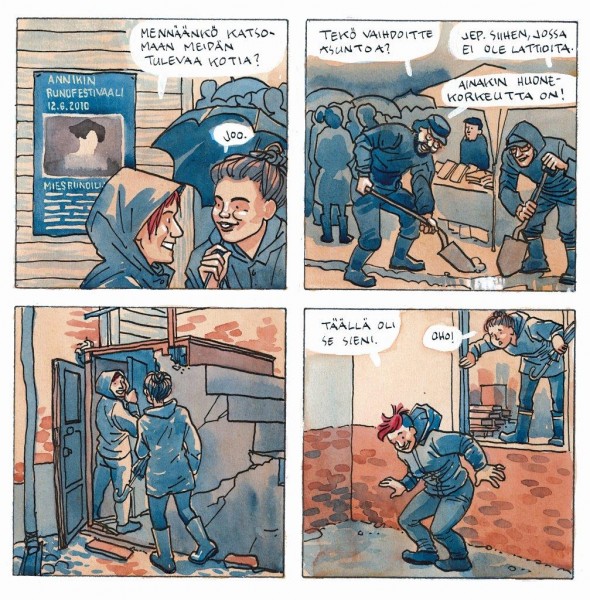Search results for "markku paasonen"
A brush with death
30 September 2000 | Archives online, Fiction, Prose
From the collection of short prose Hyväkuntoisena taivaaseen (‘Getting to heaven in good shape’, Tammi, 1999)
I had agreed to meet Death at the Assembly Rooms in the centre of Helsinki. Seldom has an interview made me feel so nervous beforehand. Luckily, this gave me a good reason to cancel an appointment with my dentist. (Although of course I know that in the end I shall have to go there myself.)
It is customary to regard Death as a man who is not affected by the whims of fashion. Thus it is surprising to hear that Death is particularly concerned about his public image. ‘In public, I am considered stern and unbending. Unchanging and therefore uncontrollable,’ Death thunders. ‘This is not at all accurate. Fortunately, people understand me better when I am at work. More…
Suomalaiset tutkimusmatkat [Finnish scientific expeditions]
23 December 2009 | Mini reviews, Reviews
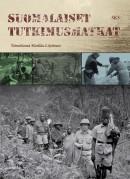 Suomalaiset tutkimusmatkat
Suomalaiset tutkimusmatkat
[Finnish scientific expeditions]
Toim. [Edited by] Markku Löytönen
Helsinki: Suomalaisen Kirjallisuuden Seura, 2009. 480 p., ill.
ISBN 978-951-746-774-2
€ 64, hardback
This book is a comprehensive survey of Finnish scientific expeditions from the 18th century up to the present day. It covers the sciences that traditionally involve field research: geology and palaeontology, botany and zoology, geography, oceanography, archaeology, linguistics, and anthropology. The book consists of 13 chapters written by experts in their respective fields. The best-known expeditions undertaken by Finns are A. E. Nordenskiöld’s voyage to the North-East Passage, J. G. Granö’s expedition to the Altai Mountains and Rafael Karsten’s travels with Amazonian headhunters. Other chapters tell of current fieldwork projects involving Finns, including research in the Amazon region and Antarctica, as well as the high Arctic. This book does not confine itself to Earth-bound scientific research; it even includes cosmology and space research – areas where scientific equipment developed by Finns have played important roles.
Seekers and givers of meaning: what the writer said
2 October 2014 | This 'n' that
 ‘All our tales, stories, and creative endeavours are stories about ourselves. We repeat the same tale throughout our lives, from the cradle to the grave.’ CA
‘All our tales, stories, and creative endeavours are stories about ourselves. We repeat the same tale throughout our lives, from the cradle to the grave.’ CA
‘Throughout a work’s journey, the writer filters meanings from the fog of symbols and connects things to one another in new ways. Thus, the writer is both a seeker of meaning and a giver of meaning.’ OJ
‘Words are behind locks and the key is lost. No one can seek out another uncritically except in poetry and love. When this happens the doors have opened by themselves.’ EK
‘I realised that I had to have the courage to write my kind of books, not books excessively quoting postmodern French philosophers, even if that meant laying myself open to accusations of nostalgia and sentimentality.’ KW
‘If we look at the writing process as consisting of three C:s – Craft, Creativity and Chaos – each one of them is in its way indispensable, but I would definitely go for chaos, for in chaos lies vision.’ MF
‘In the historical novel the line between the real and the imagined wavers like torchlight on a wall. The merging of fantasy and reality is one of the essential features of the historical novel.’ KU
‘The writer’s block isn’t emptiness. It’s more like a din inside your head, the screams of shame and fear and self-hatred echoing against one another. What right have I to have written anything in the first place? I have nothing to say!’ PT
‘…sometimes stanzas have to / assume the torch-bearer’s role – one / often avoided like the plague. / Resilient and infrangible, the lines have to / get on with their work, like a termite queen / laying an egg every three seconds / for twenty years, / leaving a human to notice / their integrity. ’ JI
In 2007 when Books from Finland was a printed journal, we began a series entitled On writing and not writing; in it, Finnish authors ponder the complexities, pros and cons of their profession. Now our digitised archives make these writings available to our online readers: how do Claes Andersson, Olli Jalonen, Eeva Kilpi, Kjell Westö, Monika Fagerholm, Kaari Utrio, Petri Tamminen and Jouni Inkala describe the process? Pain must coexist with pleasure…
From 2009 – when Books from Finland became an online journal – more writers have made their contributions: Alexandra Salmela, Susanne Ringell, Jyrki Kiiskinen, Johanna Sinisalo, Markku Pääskynen, Ilpo Tiihonen, Kristina Carlson, Tuomas Kyrö, Sirpa Kähkönen – the next, shortly, will be Jari Järvelä.
Do you speak my language?
23 August 2012 | Articles, Non-fiction
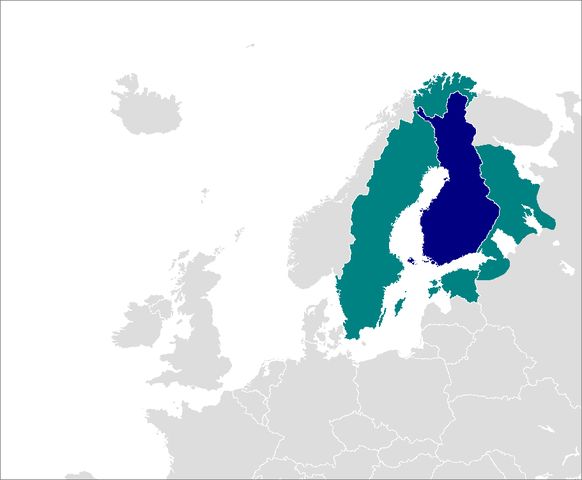
Finnish spoken outside Finland: Sweden (west), Estonia (south), Karelia/Russia (east), Norway (north). Illustration: Zakuragi/Wikipedia
Finland has two official languages, Finnish and Swedish. Approximately five per cent of the population (290,000 Finns) speak Swedish as their native language. All Finns learn both languages at school, and students in higher education must prove they have an adequate knowledge of the other mother tongue. But how do native speakers of Finnish cope with what is, for many of them, a minority language that they will never need or even wish to use? We take a look at bilingual issues – and a new book devoted to them
‘In many parts of the world, language can be a fiery and divisive issue, one that pits the powerless against the powerful, the small against the big. The Basques battle the Spanish. The Flemish tussle with the Walloons. The Québécois scuffle with the rest of Canada.’
That is how Lizette Alvarez illustrated her theme in her article ‘Finland Makes Its Swedes Feel at Home’, published in the New York Times in 2005.
In Finland, language has been a fiery issue at times, though things have cooled down a bit since the early 20th century. The use of Finnish as a written language dates back to the 16th century, but the territory of Finland was part of the Swedish Empire until 1809. Swedish was spoken by the nobility as well as most of the peasant class – the mechanism of the state did not serve Finnish-speaking peasants or other segments of the population in Finnish. More…
Living inside language
23 February 2010 | Essays, Non-fiction
Jyrki Kiiskinen sets out on a journey through seven collections of poetry that appeared in 2009. Exploring history, verbal imagery and the limits of language, these poems speak – ironically or in earnest – about landscapes, love and metamorphoses
The landscape of words is in constant motion, like a runner speeding through a sweep of countryside or an eye scaling the hills of Andalucia.
The proportions of the panorama start to shift so that sharp-edged leaves suddenly form small lakeside scenes; a harbour dissolves into a sheet of white paper or another era entirely. Holes and different layers of events begin to appear in the poems. Within each image, another image is already taking shape; sensory experiences develop into concepts, and the text progresses in a series of metamorphoses. More…
Boys Own, Girls Own? –
Gender, sex and identity
30 December 2008 | Essays, Non-fiction
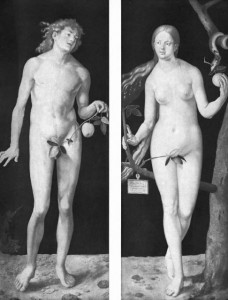
Knowing good and evil: Adam and Eve (Albrecht Dürer, 1507)
In Finnish fiction of the present decade, both in poetry and in prose, there seems to be at least one principle that cuts across all genres: an overt expression of gender, writes the critic Mervi Kantokorpi in her essay
Relationships and family have always been central concerns of literature; questions about gender and individual identity have received a new emphasis in Finnish literature from one season to the next. The gender roles represented in contemporary literature appear to become ever more stereotypical. The question is no longer only of the author consciously setting his or her gender up as the starting point for expression, as has already long been the case with modern literature written by women. More…
Picture this
9 April 2015 | Articles
It’s impossible to put Finnish graphic novels into one bottle and glue a clear label on to the outside, writes Heikki Jokinen. Finnish graphic novels are too varied in both graphics and narrative – what unites them is their individuality. Here is a selection of the Finnish graphic novels published in 2014
Graphic novels are a combination of image and word in which both carry the story. Their importance can vary very freely. Sometimes the narrative may progress through the force of words alone, sometimes through pictures. The image can be used in very different ways, and that is exactly what Finnish artists do.
In many countries graphic novels share some common style or mainstream in which artists aim to place themselves. In recent years an autobiographical approach has been popular all over the worlds in graphic novels as well as many other art forms. This may sometimes have led to a narrowing of content as the perspective concentrates on one person’s experience. Often the visual form has been felt to be less important, and clearly subservient to the text. This, in turn, has sometimes even led to deliberately clumsy graphic expression.
This is not the case in Finland: graphic diversity lies at the heart of Finnish graphic novels. Appreciation of a fluent line and competent drawing is high. The content of the work embraces everything possible between earth and sky.
Finnish graphic novels are indeed surprisingly well-known and respected internationally precisely for the diversity of their content and their visual mastery.
Life on the block
Kirja muuttuvassa tietoympäristössä [The book in a changing information environment]
21 August 2014 | Mini reviews, Reviews
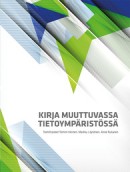 Toim. [Ed. by] Markku Löytönen, Tommi Inkinen, Anne Rutanen
Toim. [Ed. by] Markku Löytönen, Tommi Inkinen, Anne Rutanen
Helsinki: Suomen tietokirjailijat ry. [The Finnish Association of Non-Fiction Writers], 195 p., ill.
ISBN 978-952-67356-3-4
paperback; available also online:
http://www.suomentietokirjailijat.fi/jasenyys/julkaisut/kirja-muuttuvassa-tietoymparisto/
In the Western world the experience of reading is undergoing a critical change. There is even talk of a third information revolution. Books are increasingly acquiring electronic form, and the future of the printed book is being called into question. Kirja muuttuvassa tietoympäristössä contains the considered opinions of 18 experts on what is taking place in the field of non-fiction, and gives an overview of the literature on the current situation, which is seen from the point of view of the bookstore, the library, the author and the publisher. There is a discussion of intellectual property issues, developments in technology, and changes in the use of teaching materials, language, and reading habits. Finland is a leading country in both literacy and reading. The number of books has slowly declined in recent years, but it seems that the country’s youth has maintained an interest in books, and in fiction in particular. Although printed reference works of the encyclopedia type have given way to the information provided by the Internet, it is likely that literature and reading will preserve their status as a part of human culture.
Translated by David McDuff
Runeberg Prize 2013 for poetry
8 February 2013 | In the news
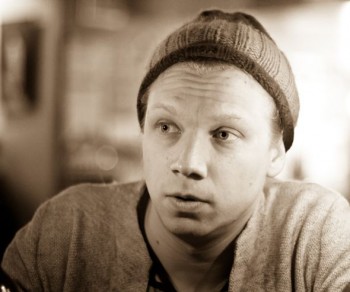
Olli-Pekka Tennilä. Photo: Aleksis Salusjärvi, 2012
The Runeberg Prize for fiction, awarded on 5 February, this year for the twenty-seventh time, went to a book of poetry by Olli-Pekka Tennilä (born 1978).
Tennilä’s second work, Yksinkeltainen on kaksinkeltaista (‘Doubly simple’, a pun: yksinkertainen = simple, kaksinkertainen = double, keltainen = yellow), published by Poesia, makes use of a child’s open-minded use of language and studies the world of the bees. Tennilä is one of the founding members of Osuuskunta Poesia, a poetry cooperative, and is currently its publishing director.
The prize, worth €10,000, was awarded on 5 February – the birthday of the poet J.L Runeberg (1804–1877) – in the southern Finnish city of Porvoo.
The jury, writer Tommi Melender, critic Siru Kainulainen and theatre manager Dan Henriksson – representing the prize’s founders, the Uusimaa newspaper, the city of Porvoo, both the Finnish and Finland-Swedish writers’ associations and the Finnish Critics’ Association – chose the winner from a shortlist of eight books. In their opinion the winning work is both ‘a structurally controlled and expressively vital whole; it demonstrates how the linguistic logic of a small child can be employed again as an adult.’
The other seven finalists were a book of essays, Toinen jalka maassa ja muita esseitä (‘One foot on the ground and other essays’, WSOY) by Markku Envall, two poetry collections, Keisarin tie (‘The emperor’s road’, Otava) by Lassi Hyvärinen and Kuolinsiivous (‘Death cleaning’, WSOY) by Eeva Kilpi, two collections of short stories, Kadonnut ranta (‘Lost shore’, WSOY) by Tiina Laitila Kälvemark and Till dig som saknas (‘To you who are missing’, Schildts&Söderströms) by Peter Sandström, as well as two novels, Rikosromaani (‘Crime novel’, Otava) by Petri Tamminen and Neuromaani (‘Neuromane’, Otava) by Jaakko Yli-Juonikas.
The Last War Hero
31 March 1981 | Archives online, Fiction, Prose
An extract from 30-åriga kriget (‘The Thirty Years’ War’). Introduction by Markku Envall
First he heard the noise.
It was an unfamiliar noise and therefore doubly dangerous. Viktor grabbed his machine-pistol. It was a sputtering noise, like that of a cracked machine-gun. But it came from above. And what came from above could be dangerous, Viktor knew.
Then he saw the helicopter, flying just above the tree-tops. He had never seen a helicopter before. Nor had he ever seen the circular markings carried by the aircraft as a sign of the nationality. More and more nations were getting involved, he had had a visit from an American, for all he knew this might be a plane from Australia. The Russians must be in a tight corner if they had to keep sending their allies into the firing line.
He bitterly regretted having let the American sergeant get away.
Now they were after him in real earnest. It must have been the Yankee who had sent them.
Viktor directed a long burst of fire at the plane, which was now hovering almost motionless in the air, like a bee over a flower. The bullets shattered the roboter blades, splinters flew in all directions, and the helicopter dived at a steep angle and plunged into the lake. Viktor leapt to his feet and shouted “Hurrah!” and proceeded to execute a gleeful victory dance. He had shot down an enemy aircraft. More…
Aphorisms
31 December 1986 | Archives online, Fiction, Prose
Aphorisms from Pahojen henkien historia (‘A history of evil spirits’, 1986). Markku Envall’s essay on aphorism
Do not set out in the wrong mood, at the wrong moment, for the wrong place.
Learn to distinguish these from one another, for it is an impossible task.
Do not admit to changes in yourself, say rather that your associates vary.
And that your relationships are changeable. But do not say this of yourself.
Not knowing a person should not be regarded as sufficient reason for not making his acquaintance. More…


